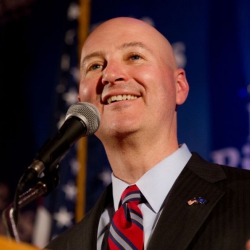
Governor Pete Ricketts likely would be unwilling to sign a bill to expand land-based gambling in Nebraska.
Nebraskan gaming activists are seeking a casino referendum for this November’s election. The group, called Keep The Money in Nebraska, is collecting signatures to have the issue go before voters.
With a day remaining in the petition drive, Keep the Money in Nebraska is confident it will have enough signatures to proceed. Scott Lautenbaugh, a spokesman for the group, said his group expects to have more than enough signatures.
“Keep the Money”
The effort has been organized and energetic. Keep The Money has gathered signatures outside high-traffic areas, such as the College World Series and a Justin Beiber concert. On a local level, volunteers have collected signatures outside courthouses and nearby DMVs. The group has until July 7 to file its petition with the Nebraska Secretary of State.
Lautenbaugh said three separate petitions are being circulated. One is to allow casino gambling in the state. Another petition involves the licensing of all forms of gambling at Nebraska’s racetracks. The third petition proposes to regulate racetrack gambling, including the gaming machines which would be placed at tracks, if the second petition succeeded.
No Slots Nebraska
A coalition of residents is working against the first petition. The group, calling itself No Gambling Nebraska, wants no expansion of gambling inside the state. They want to see no expansion of gambling inside Nebraska, on social and religious grounds.
A flier put out by NoSlotsNebraska claims that, under the petitioners’ plan, “No money [would be] designated for property tax relief, education, or addiction counseling.”
Unbearable Social Costs
The flier also stated that casino gambling would bring “unbearable social costs to the state“, and that statistics prove casinos cause an “increase in crime, bankruptcies, embezzlements, divorce, abuse, and even suicides.”
The copy goes on to compare Nebraska to the case of Deadwood, South Dakota, which saw child abuse increase 42% and domestic violence increase 80% within two years of slot machines being placed in the city, according to a four-part series of articles (“Dead Broke”) in the Minneapolis Star Tribune in 1996.
Other Explanations
While the inclusion of slot machines in Deadwood might account for a higher incidence of crime and corruption, the numbers quoted by the Minneapolis Tribune are not in line with statistics from other casino openings across the nation. To explain the higher crime rate, one has to consider alternative explanations.
Other explanations might exist for that increase in child abuse and domestic violence.
The mid-1990s saw the rapid spread of meth addiction across the United States. The years 1994-1996 were the time when crystal meth first began to appear in South Dakota, as this National Drug Control Policy Office chart labeled “Spread of Methamphetamine” halfway down the page shows.
While it causes a sensation to suggest that slot machines cause massive social disruption, the Deadwood argument has serious flaws.
Tribal Gaming Impact
Keep The Money in Nebraska points to statistics which show Nebraskans love to gamble, so they drive out-of-state to enjoy betting. They do not have to, because a number of tribal casinos exist in the state. The existence of such casinos somewhat belie NoSlotsNebraska‘s contention about the higher crime rates, or else they would cite statistics from Nebraska’s own past to argue against casinos.
At present, Nebraska has 9 legal gaming venues. These include 5 tribal casinos, located in Emerson, Lincoln, Niobrara, Walthill, and Winnebago. The state also has four race tracks, which are found in Omaha, Hastings, Grand Island, and Columbus.
Nebraska Horse Racing
Horse racing is considered a part of the American fabric, though. Most racetracks are decades-old and venerable, which is why states often pass gaming machine laws to convert them into racinos. The idea is to modernize, so the tracks can stay open.
As far as tribal casinos go, such businesses are beyond the average Nebraskans’ control. Due to a 1986 US Supreme Court ruling, Native American tribes can build casinos on their reservations, even if the surrounding state bans casino gambling. The reservations are considered sovereign territory, because those tribes signed sovereign treaties with the United States government which go back into the 19th century.
Tribes must come to a compact with their state on revenues and policies, but a state government cannot deny a casino license. The ultimate decision lies with the U.S. Department of the Interior, which has handled “Indian Affairs” since the 1800s.
